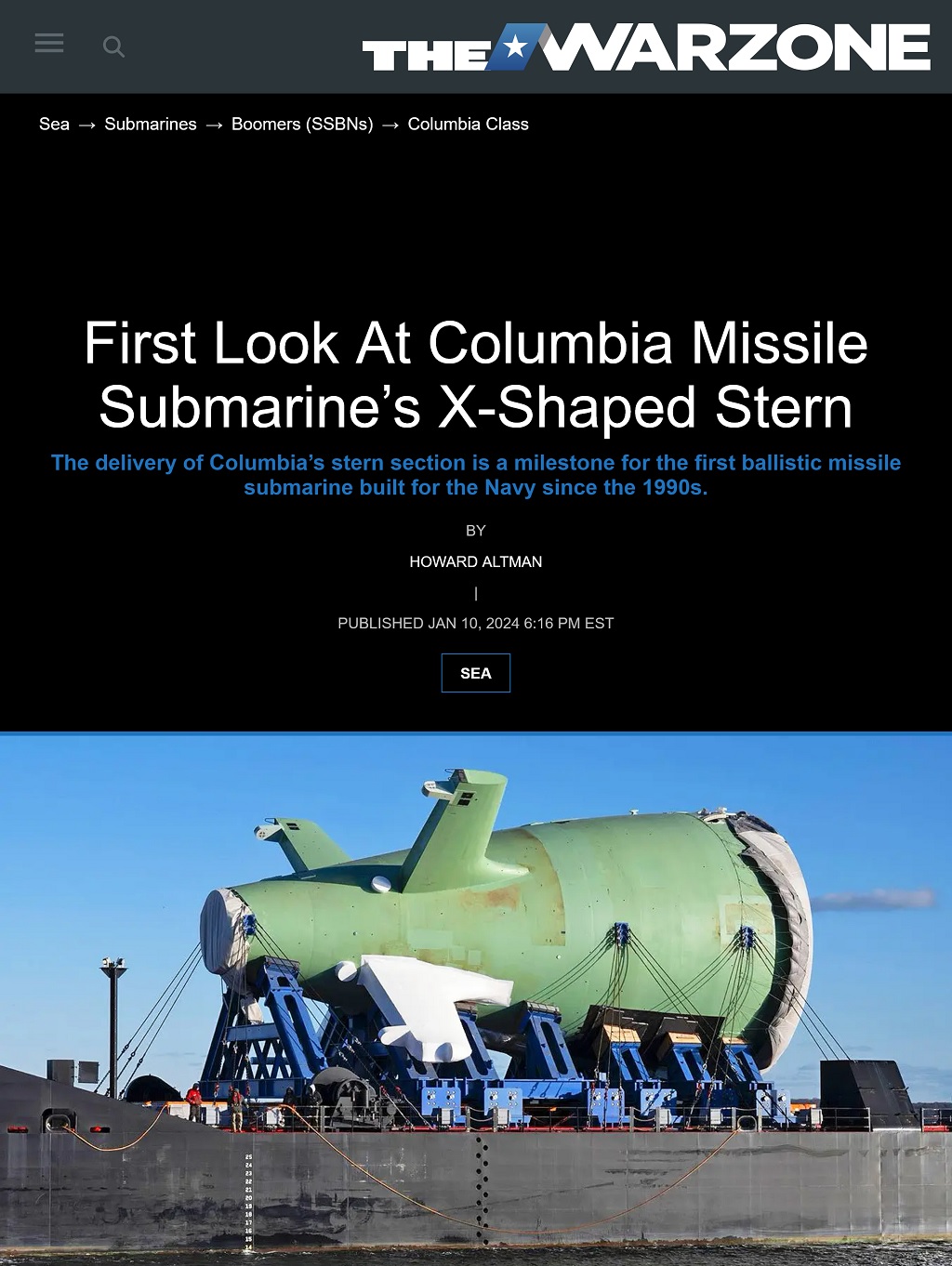The delivery of Columbia’s stern section is a milestone for the first ballistic missile submarine built for the Navy since the 1990s.
The first Columbia class submarine stern section has been delivered to General Dynamics Electric Boat. The massive component will serve as the propulsion section of the inaugural Columbia-class nuclear ballistic missile submarine, the USS District of Columbia. The vessel is the first of a planned 12 boat fleet designed to replace the existing 14 Ohio-class boomers in what the Navy says is its top-priority acquisition program.
Images of the first stern section were released on Wednesday by HII’s Newport News Shipbuilding Division, which built the stern section and General Dyamics Electric Boat (GDEB), which is constructing the submarines.
Image: Stern section view 1 (HII photo)
Image: Stern section view 2 (HII photo)
The stern section was shipped aboard Holland – GDEB’s 400-foot barge – for the 400-mile journey from Newport News to GDEB’s Quonset Point, Rhode Island shipyard. It arrived there last week.
Image: A rendering of the Columbia class submarine. (General Dynamics Electric Boat image)
The images show the Columbia class’s distinctive x-shaped stern configuration, the first one designed for a U.S. submarine in six decades, with the USS Albacore featuring it back the 1960s. The configuration provides enhanced maneuverability, efficiency, and safety, as well as acoustic signature reductions across major parts of the submarine’s operating envelope compared to the current cruciform system used on existing American submarines. The x-stern configuration has become increasingly popular and is now found on other submarine designs around the globe.
The Columbia class is designed to be the largest and most complex submarine ever procured by the Navy, according to the Government Accountability Office (GAO). The Navy is planning to spend $132 billion on the program and GDEB has a target of delivering the first one in April 2027, according to the GAO. It is the first new ballistic missile submarine the Navy has built since the 1990s.
Image: View 1 The first Columbia class submarine stern rides underneath the Jamestown Verrazzano Bridge heading to the General Dynamics Electric Boat plant in Quonset Point, Rhode Island. (General Dynamics Electric Boat)
Image: View 2 The first Columbia class submarine stern rides underneath the Jamestown Verrazzano Bridge heading to the General Dynamics Electric Boat plant in Quonset Point, Rhode Island. (General Dynamics Electric Boat)
Image: The Columbia class submarine stern at dock. (General Dynamics Electric Boat)
Because the current Cold War-era Ohio class boats will begin to retire in 2027, the Navy wants the USS District of Columbia to be on patrol by October 2030. There has been talk of extending the life of some of the Ohio class SSBNs in oder to accommodate more slippage in this schedule.
To ensure an uninterrupted presence of the undersea component of the nuclear triad, the Navy has made the Columbia class its priority. As we wrote previously, that has impacted the production of its Virginia class fast attack submarines. GDEB, which is producing those submarines as well, has 17 Virginia class boats in its current backlog delivering through 2032, according to Reuters.
Image: The Virginia-class fast-attack submarine USS Illinois (SSN 786) returns home to Joint Base Pearl Harbor-Hickam from a deployment in the 7th Fleet area of responsibility on Sept. 13, 2021. (Mass Communication Specialist 1st Class Michael B. Zingaro/U.S. Navy via AP)
Given the importance of the program, the Navy is working to make sure that the Columbia class stays on track throughout the production process. The sea service is working to accelerate the remaining construction work on the District of Columbia to brace for potential delays in the boat’s testing later this decade, Defense News reported in October.
The Navy and GDEB originally built a six-month buffer into the construction schedule, the publication reported, but that has eroded due to “pandemic-related challenges and contractor performance,” according to Defense News. There has been other issues with the program, including issues with poor welds on missile tubes for the boats.
Still, the Navy has confirmed the District of Columbia is still “on its contractually mandated schedule,” Defense News reported.
We’ve reached out to the Navy and GDEB for more details.
The delivery of the District of Columbia‘s stern section is a positive sign for a vital Navy procurement program. We will continue to monitor it as it progresses.
Contact the author: howard@thewarzone.com


